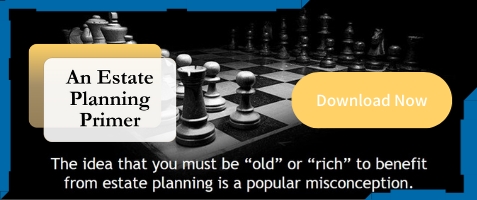You are now leaving the Chase Investment Counsel website and entering the Chase Growth Fund website.

5 Key Estate Planning Tips
Have you ever thought about who you plan to leave money, assets, or other belongings to after you pass away? Who would you like to make financial or healthcare decisions on your behalf should you become seriously ill or incapacitated? Establishing an estate plan addresses these issues and can be custom-made to fit your unique wants and needs. Here are five steps to help you establish and implement an estate plan.
1. Establish a Power of Attorney
While you may be able to make financial decisions for yourself right now, there are situations where you may want to vest someone else to conduct financial transactions on your behalf. A power of attorney is a legal document allowing an authorized person to operate on your behalf with regard to the management of finances. A general power of attorney allows the authorized person to do anything you could do, so it is usually only reserved for spouses. A limited power of attorney only gives specific, detailed powers. A power of attorney can also be structured as a springing power, so that it springs into existence upon some defined event and ends when the event is over.
2. Inventory and Value Assets
Before deciding how you want your estate distributed, you first need to take inventory of your assets. You may be surprised by all the tangible and intangible assets you have. Once inventoried, asset values need to be estimated. This may require third-party valuations for tangible high-dollar items such as an appraisal on the value of your home or professional estimates of collectibles or personal possessions. Values of intangible assets such as bank and retirement accounts, life insurance policies, or stocks and mutual fund holdings can be gleaned from their respective statements.

Decide on beneficiaries of your assets and periodically review as life changes occur. Many intangible assets pass by contract (according to the beneficiaries named on the account documents). You want to ensure that you have named beneficiaries as well as contingent beneficiaries. Review your beneficiaries on these accounts periodically to ensure that they are up to date. Life changes (death, divorce, remarriage) may necessitate a change. In addition, asset appreciation (or expected appreciation) may play a role in determining who you want to list as beneficiaries for a particular asset.
4. Prepare a Will or Trust
The goal of a will or trust is to transfer assets to heirs in the most effective and efficient way. Wills only go into effect upon death, can be completed at low costs and are easily amended. A will outlines who will receive your assets after your death, and if you have minor children, it designates who will be their guardian. Without a will, a judge will likely make these important determinations. Importantly, wills go through probate, which can be a potentially lengthy and costly court-supervised process, subject to public scrutiny. Also, probate may delay transferring assets to heirs.
A living trust goes into effect while you are still alive, and legal title to assets are vested in a trustee who manages the assets for beneficiaries. While establishing a trust is more involved and costly than a will, it avoids the cost and delay of probate and protects the details of your assets. A living trust is the most common form of trust, lets you retain control of the assets you place in the trust while you are alive, then transfers them to beneficiaries upon your death.
5. Minimize Estate and Gift Taxes
Gifting is one way that you can begin the orderly distribution of your estate while you are still alive. Current federal law allows an annual gift tax exclusion of $15,000 per person in cash or assets, meaning you can gift up to that amount annually to as many people as you want, without paying gift tax on the sum. The current lifetime gift tax exemption is $11.7 million, and if done properly, would allow you to gift someone up to that amount this year without paying any gift taxes on the transfer. The threshold before paying gift or estate taxes is scheduled to drop to $6 million in 2026, and the IRS has stated there will be no clawbacks on lifetime gifts made above this amount made prior to 2026. In selecting assets for gifts, the best method is to gift assets expected to go up in value, which removes future appreciation from your estate while taking advantage of the asset’s current lower value.
Benjamin Franklin wrote that “by failing to prepare, you are preparing to fail.” By taking the time now to begin the estate planning process, you can make sure that your wishes are carried out upon your passing.
Read Next – Estate Planning: How to Avoid Probate
About Chase Investment Counsel
Chase Investment Counsel is a family and employee-owned boutique wealth management firm that offers personalized investment services. Our clients include career professionals, those nearing or in retirement, and families experiencing financial transitions such as generational wealth transfer, widowhood, divorce or sale of a business. Chase’s active, disciplined investment management team is focused on selecting individual stocks and bonds targeted to each investor’s specific financial goals and risk tolerance. Established in 1957 in Charlottesville, VA, Chase Investment Counsel manages approximately $300 million in assets.
Chase Investment Counsel Corporation
350 Old Ivy Way, Suite 100
Charlottesville, VA 22903-4897
Direct: 434.293.9104
Shareholder Services: 888.861.7556
[email protected]
© 2021 Chase Investment Counsel Corporation